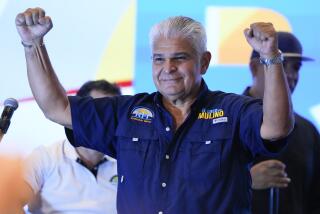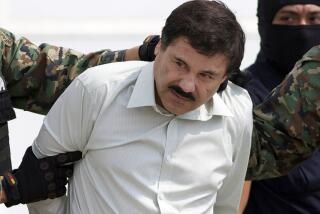Noriega May Pull Strings Even if He Leaves, U.S. Fears
WASHINGTON — Panamanian strongman Manuel A. Noriega could continue to play a major backstage role in his country’s politics even if he retires under a deal proposed by the Reagan Administration, White House National Security Adviser Colin L. Powell said Sunday.
“It’s not clear that we can remove him from actions behind the scenes. . . . The question of what he does after stepping down from power is problematic,” Powell said in a television interview.
“Will he continue to be a force to be reckoned with? One never knows,” Powell said. “But the important thing is that he steps down from his power base.”
Powell’s statement confirmed reports that the Administration has retreated from its initial insistence that Noriega, whom U.S. officials have condemned as a dictator and drug trafficker, must be deprived of any role in Panamanian politics once he is out of power.
U.S. Offer Confirmed
Powell and Secretary of State George P. Shultz, in separate television appearances, officially confirmed for the first time that the Administration has offered Noriega a deal under which U.S. drug indictments against the Panamanian leader would be dropped if he agrees to give up his post as commander of the country’s ruling military.
Both officials noted that President Reagan has not yet approved the deal--in part because Noriega has apparently not agreed on all the details of his proposed retirement.
But they both defended the plan as a chance to restore democracy to Panama in exchange for dropping indictments against a man who appears impossible to prosecute.
“We have no ability to extradite him from Panama,” Shultz said on ABC’s “This Week With David Brinkley,” noting that there is no extradition treaty with Panama.
“So you ask yourself, which situation are we better off in? To have Noriega more or less in charge in Panama and us with an indictment that we can’t do much about . . . or having Noriega give up power in Panama and leaving Panama, but also having paid that penalty?
“It is a difficult judgment,” Shultz said.
“The President has agreed for the deal to be put on the table, but it has not gone to closure,” Powell said on the CBS program “Face the Nation.”
“What is in it for us, should we decide to do it, is that it would get him out of power,” Powell said. “We would have the opportunity of restoring democracy to Panama, and a drug kingpin would no longer be at the legal, formal head of the Panamanian Defense Force.”
Powell acknowledged, however, that Noriega might retain an informal role in Panamanian politics even after he retires.
U.S. officials have described their proposal as requiring Noriega to retire in August and leave Panama from September until after presidential elections in May, 1989, except for a visit home for the Christmas holidays.
“The elements on the table would remove him from the political process, and he would not be a candidate for election in 1989,” Powell said.
The national security adviser said that the deal requires the appointment of a new military commander and the creation of a “government of national reconciliation” that would include both pro-Noriega elements and members of the opposition.
Powell said that the government would include both men who claim the title of president--Eric A. Delvalle, deposed by Noriega but still recognized by the United States; and Manuel Solis Palma, installed by the National Assembly to replace Delvalle but rejected by the United States. The proposed coalition government would name a new president who would serve until the 1989 election, Powell said.
More to Read
Sign up for Essential California
The most important California stories and recommendations in your inbox every morning.
You may occasionally receive promotional content from the Los Angeles Times.











